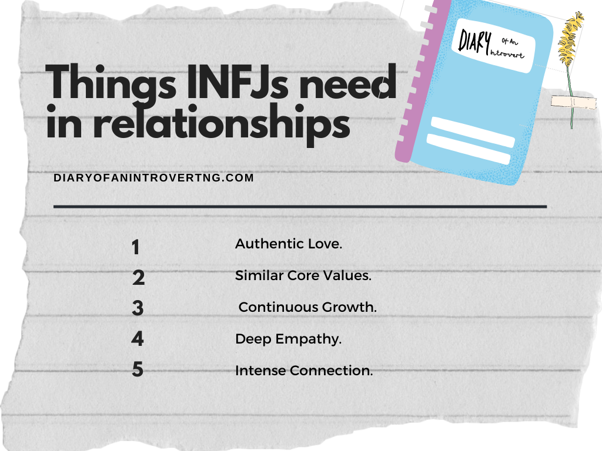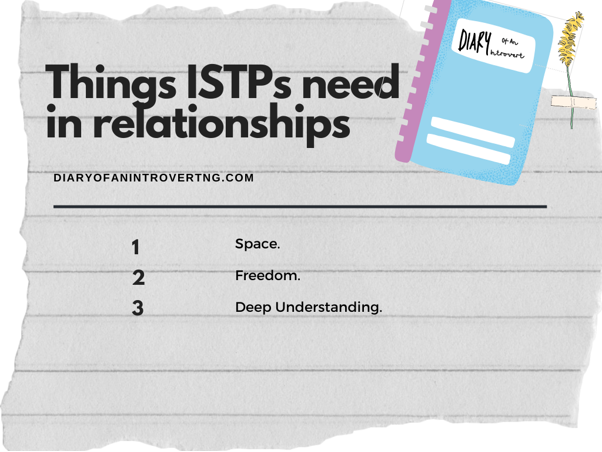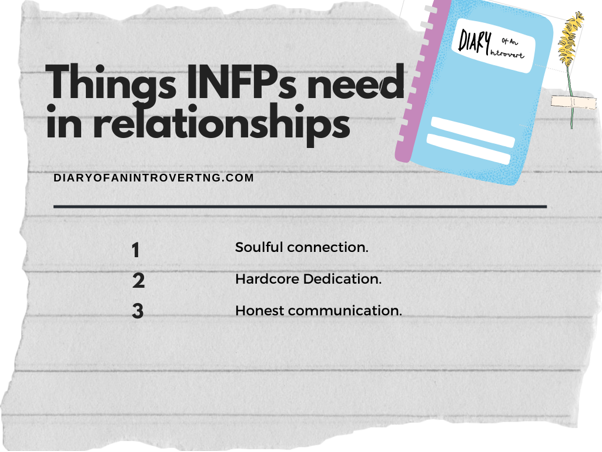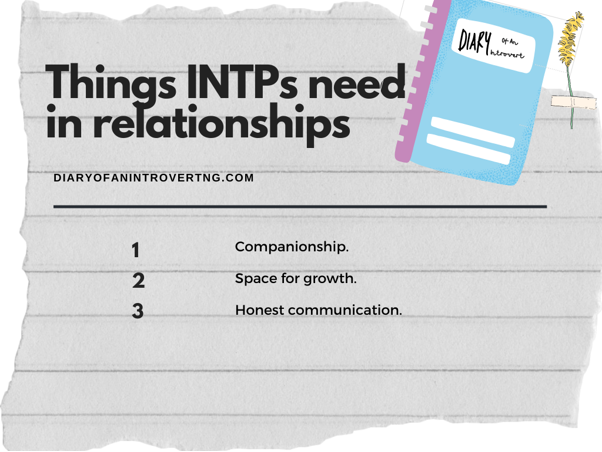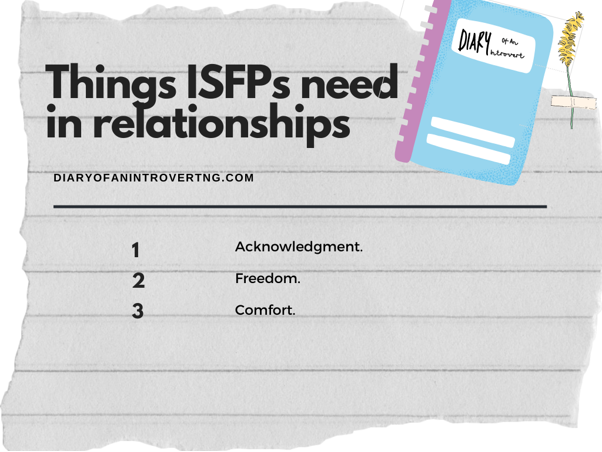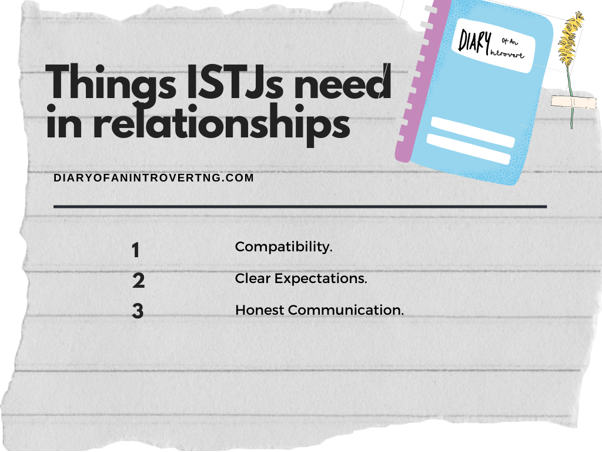5 Easy Hidden Things Each Introverted MBTI Needs in Relationships
Photo by Mathilde Langevin on Unsplash
Every successful relationship requires mutual understanding from the partners involved. It’s crucial for couples to know their personalities and work towards appeasing one another.
Are you wondering what the introverted Myers-Briggs types desperately need in their romantic relationships? If you’re one of the introverted MBTI types, then you’re in luck because this article is for you.
Let’s take a look at approximately five things each introverted 16 personalities type needs to have successful relationships.
(INFJ) - Advocate Personality
INFJs are deep lovers who often have high expectations from their relationships, which is why people might tag them as choosy. Advocates invest enough effort into making their relationships work, and this process gives them one of the most sincere and deepest romantic associations that others wish to accomplish.
If you’re dating an INFJ or hoping to date one, you’d need some tips to make the association even better. Below are five secrets to having a successful INFJ relationship.
Authentic Love.
The beauty of INFJ characters is its profoundness. People with this personality type aren’t superficial or surface-based. They pay attention to the intricate details of life and find meaning wherever they go. Therefore, the most important thing they desire in their relationships is purposefulness.
Due to their Introverted Intuition (Ni) cognitive function, INFJs are constantly looking for the why behind every situation or thing. Knowing the ultimate purpose of why you want to date an INFJ can help you love them authentically, which is what they ultimately need.
2. Similar Core Values.
This factor is a crucial aspect of any INFJ relationship because it determines how deep the connection would be. If an INFJ feels they can’t bond with you on a severe level, it would make the association difficult to bear.
This point is essential because Advocates have sound principles. They have certain standards about life, and wouldn’t want their significant others pushing them to their limits. Therefore, it’s crucial to understand an INFJs perspective about life, and likewise agree with them, for things to work.
3. Continuous Growth.
One of the things INFJs prioritize is learning new things and developing their mindsets. Personal growth is essential to them and also crucial in their romantic relationships. If an INFJ’s partner isn’t constantly improving, it can be a major setback in the relationship.
Advocates often desire to reach an admirable level of depth in their association. This process can be a challenge if their partners don’t prioritize growing as individuals. If they prefer to stick to their previous knowledge, it can prevent the association from growing as expected.
4. Deep Empathy.
Advocates are known for their caring and sensitive natures, often because of their Extroverted Feeling (Fe) auxiliary function. They can connect with others more profoundly than some types, and are deeply empathetic. Although this trait is remarkable, it can make INFJs unaware of what they truly want.
Therefore, a critical factor that can make an INFJ’s relationship more successful is deep empathy from the other side. INFJs unconsciously need their significant others to acknowledge and cater to some of their challenges, especially if they may be too charitable to realize them.
5. Intense Connection.
Another crucial thing INFJs need in their relationships is a fierce connection. INFJs may not always be the best at expressing their feelings, mostly because of how deeply entangled their emotions are to those around them.
Therefore, having an intense connection can make this dilemma resolvable because their partners can sense things about them even without them speaking. INFJs don’t just need a physical connection, but they crave an emotional, and even a spiritual one, that makes them one with their partners.
(ISFJ) - Defender Personality
Known for their loving and altruistic natures, ISFJs tend to make great partners. But even though ISFJs can make others happy, they need some secret things to enjoy their relationships.
If you’re in a relationship with an ISFJ or hope to date one successfully, here are two critical things needed in an ISFJ relationship.
Commitment.
The personalities of Defenders often show in comfortable environments or when around familiar people. Being around their loved ones or in a workplace can help them display their never-ending acts of kindness. This factor also applies to their romantic relationships.
A deep sense of familiarity or an established friendship can help a Defender be more affectionate to their partner. However, this process arises on the premise of commitment. ISFJs tend to uphold long-term commitment as a religion, and often don’t enter into relationships until they’re sure it’ll be a lifelong connection.
Having this factor in mind can help you prioritize your friendship with a Defender, especially if you intend to date them. More so, it’ll help you be patient enough for them to truly be comfortable and showcase their hidden personalities around you.
2. Acknowledgment.
ISFJs have Extroverted Feeling (Fe) as their auxiliary function, which explains their compassionate nature towards others. However, the problem with this function is that it makes a person more in tune with other people’s emotions than their own. Therefore, ISFJs might struggle with emotional expression, but it doesn’t mean they don’t feel things deeply.
Disregarding or neglecting a Defender’s feelings can often create a rift in their associations. Although their love language is often geared towards ‘acts of service’, it doesn’t mean that ISFJs don’t need other things like quality time, words of affirmation, or even receiving gifts.
Defenders’ partners can unknowingly take them for granted, especially because of their altruistic nature. However, it’s crucial to acknowledge or consciously appreciate an ISFJ to prevent difficulties in the association.
(ISTP) - Virtuoso Personality
The ISTP personality is full of paradoxes. ISTPs might not be open books but they alternatively wear their hearts on their sleeves in spontaneous ways. More so, ISTP relationships might seem complex, but their partners can indeed have an exhilarating encounter with them.
Despite the ever-changing mindsets of Virtuosos, having a successful relationship with them is possible, as long as you understand certain things about them. Here are three secret things ISTPs need in their relationships.
Space.
This factor might be discouraging, especially since intimacy and closeness define traditional relationships. On the contrary, ISTPs rarely enjoy conventional practices or sticking to routines. Therefore, they might not be intrigued by regular relationships. ISTPs prioritize their physical and emotional space even in their romantic associations.
Since Virtuosos live in the present and have a strong desire to explore the world using their five senses, it might be challenging for them to stay with someone that’s future-minded and loves to make schedules and plans. Understanding this factor can cause less friction in your association with them.
2. Freedom.
ISTP individuals have Introverted Thinking (Ti) as their dominant function, which means they make decisions independent of external factors. They also have Extroverted Sensing (Se) as their second strongest function, which explains why they enjoy experiencing the world by engaging their physical senses.
These two traits make ISTPs crave new adventures and want to explore endless opportunities. Virtuosos also value their freedom more than anything. They find it difficult being in a situation where their choices are constantly questioned, and this applies to their relationships. Embracing an ISTP’s sense of freedom per time can help you make them happier.
3. Deep understanding.
An ISTP’s traits tend to contradict itself. Therefore, it would take a deep sense of understanding to truly relate to people with this personality. They can be completely detached and also be passionate altogether. They can be reserved but seem sociable in certain settings. Understanding their character can prevent you from taking things too personally.
For example, knowing when a Virtuoso wants to keep to themselves versus when they want you to be unconstrained with them, will go a long way. Due to their spontaneous natures, understanding them deeply and, perhaps, establishing a soulful connection to acknowledge their different moods, will make you the best partner for them.
(INFP) - Mediator Personality
INFPs might be regarded as hopeless romantics because of their perceived notions of love. However, having a successful relationship with an INFP, or as an INFP, is more achievable than people realize. Some critical factors make all the difference in Mediators’ relationships. Therefore, here are three secret things INFPs need in their relationships.
Soulful connection.
Having an idealist personality, it’s no surprise that INFPs believe in true love. These individuals don’t just desire a partner, they want to meet their soulmate. Although their expectations of a partner can be far-fetched from reality, making a profound connection with these individuals will make all the difference.
INFPs are willing to look beyond superficial factors like appearance and possessions, as long as the person matches their ideals. They desire a mental, emotional, and soulful connection, that would make their relationship genuinely potent.
2. Hardcore Dedication.
Being the idealists that they are, INFPs tend to have a thorough view of their potential relationships. They envision events and scenarios and tend to picture how everything should be. Although they might seem like daydreamers, they tend to derive joy from merely putting in enough effort to build a happy relationship.
Therefore, having a dedicated partner makes all the difference in the lives of Mediators. As long as their significant others are willing to support and work together with them to actualize certain visions, they have hope that their dreams will come true.
3. Honest communication.
Since Mediators prioritize harmony over conflict, they tend to be on the receiving end of harsh realizations. For the most part, they might struggle to cope when their imaginations don’t match present circumstances. INFPs might want to sustain the harmony in their romantic associations and would endure discomfort even when they sense difficulties or challenges.
However, actualizing certain faults can help partners achieve their goals sooner than expected. Therefore, INFPs need partners that can tell them the truth subtly to help them be more down-to-earth in their relationships. Working on it themselves and having partners that understand this factor, can indeed, make a positive difference.
(INTP) - Logician Personality
The right relationship can help INTPs reach a greater extent of ingenuity and creativeness sponsored by their curious minds. However, due to their open-minded natures, it can often be puzzling to identify what Logicians desire in their relationships. If you’re curious to find out, below are three crucial factors in dating an INTP person.
Companionship.
Although reserved, INTPs crave companionship in their romantic relationships. Particularly, they want someone they can genuinely be themselves around and even rub minds with. Since Logicians are curious, they often want partners that can make them unveil their creative and childlike sides.
Companionship might mean something different to INTPs than other personality types. It could mean finding someone that understands their nature and encourages them to bask in it. It could also mean finding someone with similar traits that can positively challenge their ideas. Whichever way. INTPs are attracted to mental qualities, and not just physical attributes.
2. Space for growth.
There’s nothing more exciting to an INTP person than improving on their previous knowledge. Due to how analytical and curious they are, they value learning environments. Therefore, having a partner that can encourage them in this aspect would mean a lot to them. Even so, it will help them develop their mindsets over time.
The mere fact that they can connect with their partners on a deep level, discussing ideas and concepts that are unconventional, means a lot to Logicians. They enjoy the process of someone dear to them challenging them to be better, and would want to do the same in return.
3. Honest communication.
INTPs tend to be direct about their opinions and feelings, seeing no point in filtering their words. These individuals also apply this mindset in their romantic relationships. As blunt as they may seem, Logicians prioritize honest communication with their partners. They’d appreciate their significant others to be straightforward about how they feel instead of pretending around them.
They consider this process as a vital step to building a deeper connection. More so, INTPs rarely appreciate superficiality. The more their partners can be real around them, is the more they’ll appreciate the association even more. Even if it means confessing your displeasure about their bluntness, an INTP person would regard your words more than you realize.
(ISFP) - Adventurer Personality
ISFPs tend to be quiet and mysterious, which can be bothersome for those trying to get close to them. However, under the right kind of atmosphere, they can become zealous about many things. If you’re wondering what it takes to have a successful relationship with an Adventurer, here are three secret factors to consider.
Acknowledgment.
Adventurers are often hard to read due to their Introverted Feeling (Fi) dominant function. They don't wear their emotions on their sleeves, but truly feel things deeply. Being sensitive types, they express a certain level of depth in their romantic associations when they’ve gotten comfortable.
An ISFP person would prefer to focus more on their partner than let their feelings determine the mood of the relationship. People with this personality type prioritize quality time and would strive to make their partners happy in the littlest ways they can. However, the lack of appreciation or acknowledgment can push these types further into their shells.
2. Freedom.
Due to their Extroverted Sensing (Se) auxiliary function, Adventurers crave to live in the moment, experiencing the world with all their senses. ISFPs aren’t great at planning for the future because they prefer to enjoy their present. This process also applies to their romantic relationships.
ISFPs prefer not to be forced into doing anything, especially something as severe as being in a long-term relationship. They enjoy the excitement of wondering how things will play out. Therefore, constricting an Adventurer to certain ideals can be a major turn-off. The best way to embrace their hidden personalities is to let them be themselves.
3. Comfort.
Being introverts, it takes a great deal of comfort for Adventurers to come out of their shells. More so, their Introverted Feeling (Fi) dominant function makes it even harder to tell how their feeling except through close observation. Therefore, the best way to truly benefit from a relationship with an ISFP person is to ensure they are comfortable around you.
This process will help them communicate their emotions more clearly and establish a deeper bond with you. It also helps you offer the necessary emotional support they desire, especially because of their sensitive natures.
Liking this article? Join our Introvert Club→
(ISTJ) - Logistician Personality
Despite the reserved personas of ISTJs, they can create stable and dedicated romantic associations. Therefore, it’s critical to know some factors that make the process easier. If you’re looking to date an ISTJ, or you want to make your relationship with one successful, here are three secret things ISTJs need in their relationships.
Compatibility
Logisticians are practical and fact-minded individuals that consider critical factors when it comes to relationships. The most essential thing they look out for is compatibility. ISTJs want to ensure they match with a person before getting their hopes up. More so, they want to ensure a long-term association can truly work.
Therefore ISTJs might have honest conversations about certain similarities and differences with their potential partners. This process might seem strange to others, but it’s their way of evaluating how compatible both of you are. Even so, they’d openly bring up certain challenges throughout the relationship if they feel it affects the association’s compatibility.
2. Clear Expectations.
Due to their judging traits, ISTJs desire predictable outcomes. They tend to stick to routines, and this trait also translates to their romantic lives. Logisticians enjoy having clear expectations in their relationships, which means they love knowing what their partner expects of them, and knowing what to expect in their associations.
Therefore, having a vivid outlook of a romantic association matters to an ISTJ person. They often internalize whether things will be short or long-term, and act accordingly. Giving mixed signals would repel an ISTJ character, and make it hard for them to commit to a relationship with you.
3. Honest Communication.
Although ISTJs have loyal and dedicated natures, this trait doesn't always guarantee their relationships will be perfect. Due to their thinking natures, ISTJs may not naturally be sensitive to other people’s emotions. Therefore, having a successful relationship with a Logistician demands honest and open communication to avoid them analyzing everything logically.
You might need to spell out how you feel before an ISTJ might thoroughly understand you. This process prevents you from waiting for them to perceive your feelings, which might not always work. On the bright side, ISTJs are sure to tend to their partner’s complaints to the best of their abilities because of how dedicated they are.
(INTJ) - Architect Personality
Rational and intelligent, INTJs tend to take a strategic approach to their relationships. However, this might not always be the best way, especially since others might not understand their unconventional methods.
It might be impossible to change an INTJ’s mental wiring, but you can know certain things about their relationships. This process will alongside improve the quality of your romantic relationships with Architects. Here are four things INTJs need from their partners.
Loyalty.
Due to their Extroverted Thinking (Te) auxiliary function, INTJs are constantly looking for workable strategies to reach their goals. They tend to apply this mindset to their romantic relationships as well. INTJs value honesty and loyalty because it’s the best environment for partners to establish a worthwhile connection.
Even so, the unpredictability of dishonesty can make INTJs feel helpless. They don't know what to expect, nor can they take the best actions for their associations. INTJs need to know that their partners support them entirely and have the same genuine intentions as they do. More so, that they’re dedicated to building a worthwhile long-term relationship.
2. Room for Development.
INTJs are goal-oriented and never seem to back down from a challenge, except it’s truly not workable. These individuals are constantly looking for ways to solve problems, even in their romantic associations. Therefore, they might work towards their goals, and also want the same from their partners.
This process can make them see their significant others as projects, where they have to help them achieve their dreams. They also envision personal development as a great premise for a romantic relationships. They believe hard work and dedication can help couples reach their targets. Therefore, not being goal-driven can often discourage an INTJ from making any effort.
3. Alone Time.
INTJs tend to be aloof because of their Introverted Intuition (Ni) dominant function, which means they see the bigger picture of life from within. Coupled with their Extroverted Thinking (Te) auxiliary function, INTJs often need space to process information and know the best actions to take.
There’s nothing scarier to an INTJ person than not being able to accomplish their dreams. Since they’re highly ambitious and well-calculated, it would be frustrating not having ample time to think and develop strategies. Therefore, giving them space is essential. You can spot this whenever an INTJ gets too quiet, detached, or emotionally unavailable.
4. Honest Communication.
The practical mindset of Architects often makes them crave authenticity more than anything. These individuals are also rational and would rather have everyone behave the same way too. Therefore, imbibing honest communication in your relationship is the best way to relate with an INTJ.
More so, it’s crucial to know that Architects aren’t naturally receptive to other people’s emotions and would rather have their partners spell things out.
Even if you have to be blunt, an INTJ partner would appreciate your honesty and would work towards making things right. It also helps them establish clear-cut goals in the relationship and strive towards a more successful union.
Live Your Best Quiet Life
Get the Am I Too Quiet? book →
CONCLUSION
Was this article enlightening? Paying attention to your partner’s needs will make all the difference in your romantic relationship. Kindly leave a comment below if you liked this article, or share it with others.



